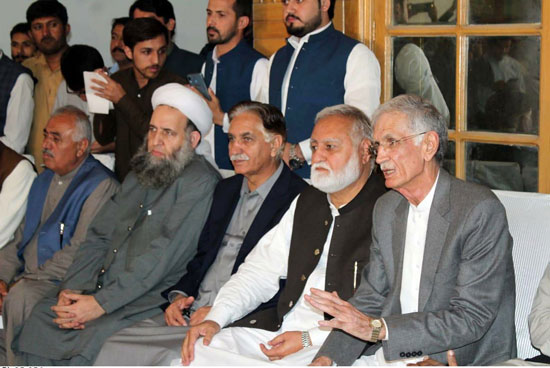Staff Reporter
Islamabad
The much awaited talks between the government’s negotiation committee and the opposition’s Rehbar Committee on the anti-government ‘Azadi March’ ended late Friday night without any results as the government rejected the demands of the Opposition.
The two sides had initially held talks with the government team putting talks on hold briefly to seek time to take top government leadership into confidence.
The meeting, which was held at JUI-F leader Akram Durrani’s residence in Islamabad, later reconvened after both sides had a discussion within their own groups.
Talks were to resume at 10pm, according to Senate Chairman Sadiq Sanjrani, but started at around 10:30pm. The Rehbar Committee members had also earlier in the day, prior to the meeting with the government, gathered for a discussion between themselves.
Defence Minister Pervez Khattak, who led the government side, said the initial talks, which lasted around two hours, were held “in a cordial environment”. “Both sides put forward their demands/proposals.
Later, after the second phase of discussions concluded without any headway, he said: “No important conclusion could be brought about today even after much discussion. But talks will continue.”
We hope to receive good news soon, said Khattak, after the first round of talks. The defence minister said this during a press conference with Akram Durrani, the Convener of the Rahbar Committee.
“They gave us some suggestions and we gave them some of our own,” said Khattak.
From the opposition camp, JUI-F leader Akram Durrani said “no conclusion could be arrived at”. Sources privy to the meeting told media that the venue of the protest remained a sticking point in the first round of discussion, with the government refusing to grant permission for it to be held at D-Chowk and instead offering that it may be held at Parade Ground. The opposition did not agree to the government’s offer.
“A delegation of the government’s senior people met us under the leadership of Pervaiz Khattak,” Durrani told newsmen.
“The talks were held in a cordial atmosphere.”
Akram Durrani further said that no date has been set for the next round of negotiations. The opposition’s demands included the prime minister’s resignation, fresh elections, supremacy of civilian institutions, and the safeguarding of clauses pertaining to Islam within the Constitution, but in the first round talks were held only on the protest venue.
According to the government team, the opposition presented them with a written set of the demands. These were discussed with the prime minister before talks resumed.
The opposition committee members in attendance included Akram Durrani, Jamiat Ulema-i-Pakistan’s Awais Noorani, PPP’s Nayyar Bukhari and Farhatullah Babar, PML-N’s Ahsan Iqbal, former National Assembly Speaker Ayaz Sadiq, Awami National Party’s Mian Iftikhar Hussain, Qaumi Watan Party’s Hashim Babar and National Party’s Tahir Bizenjo.
From the government’s side, the seven-member negotiation committee comprised Pervez Khattak, National Assembly Speaker Asad Qaiser, Sadiq Sanjrani, MNA Asad Umar, Education Minister Shafqat Mehmood, Religious Affairs Minister Noorul Haq Qadri, and Punjab Assembly Speaker Chaudhry Pervaiz Elahi.
During the course of the first meeting, Assistant Deputy Commissioner Waseem Ahmed was summoned, who arrived a few minutes later to join the discussion.
Earlier, when asked by a journalist if the government team had brought with them the prime minister’s resignation, as demanded by the JUI-F chief a day earlier, Khattak said talks about the resignation are “off the table”.
Meanwhile, JUP’s Awais Noorani, in a casual conversation with reporters, said that the opposition were standing by their demands. “If they haven’t brought in the resignation today, they will have to one day.”
JUI-F chief Fazlur Rehman had announced in June that his party had decided to hold an anti-government long march to Islamabad in the month of October in a bid to topple the government, which he sad had come to power through “fake” elections.s long as parameters laid out by courts for lawful protest are not breached.










